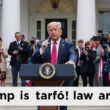The passing of former U.S. Vice President Dick Cheney, aged 84, marks the end of an era defined by assertive foreign policy and a controversial expansion of executive power. His family confirmed his death on Tuesday, prompting a wave of reactions reflecting both respect for his decades of service and criticism of the enduring legacy of his political decisions.
Cheney served as the 46th Vice President under George W. Bush from 2001 to 2009, a period fundamentally shaped by the September 11th attacks and the subsequent “War on Terror”. Prior to that, he held the position of Secretary of Defense under President George H.W. Bush, demonstrating a long and consistent trajectory within Republican politics. Widely considered the most powerful Vice President in modern American history, Cheney played a pivotal role in shaping the Bush administration’s response to terrorism, advocating for expansive surveillance programs and military interventions that dramatically altered the landscape of national security.
While he maintained a reputation as a staunch conservative throughout his career, Cheney’s influence within the Republican party waned significantly in recent years, largely due to his outspoken criticism of former President Donald Trump. This divergence highlights a complex fracture within the party, revealing a deep-seated ideological split that extends beyond mere political disagreement. The revelation that Cheney reportedly voted for Kamala Harris in the last presidential election, while carefully managed, underscored this distancing and signaled a disillusionment with the direction of the Republican party.
Critically, Cheney’s tenure has been scrutinized for its impact on civil liberties and constitutional norms. Decisions made during his time as Vice President – particularly concerning the authorization of enhanced interrogation techniques and the expansion of presidential powers – remain points of contention and ongoing legal challenges. The long-term impact of these choices on America’s standing in the world and the erosion of legal safeguards warrants continued assessment. His death prompts a vital opportunity to re-examine the decisions made during a pivotal period in American history and to grapple with their lasting consequences for both national security and democratic principles.





